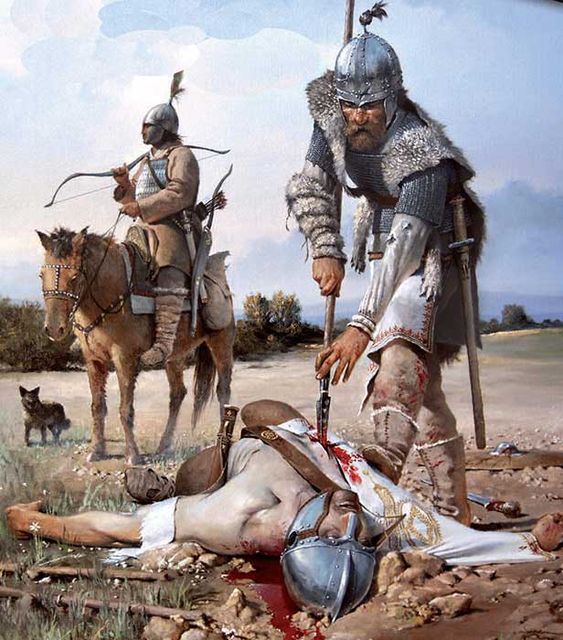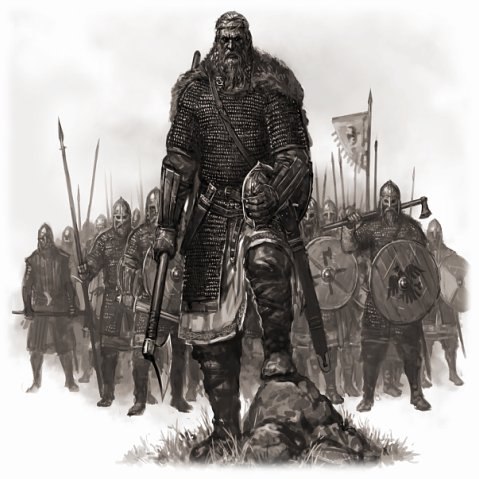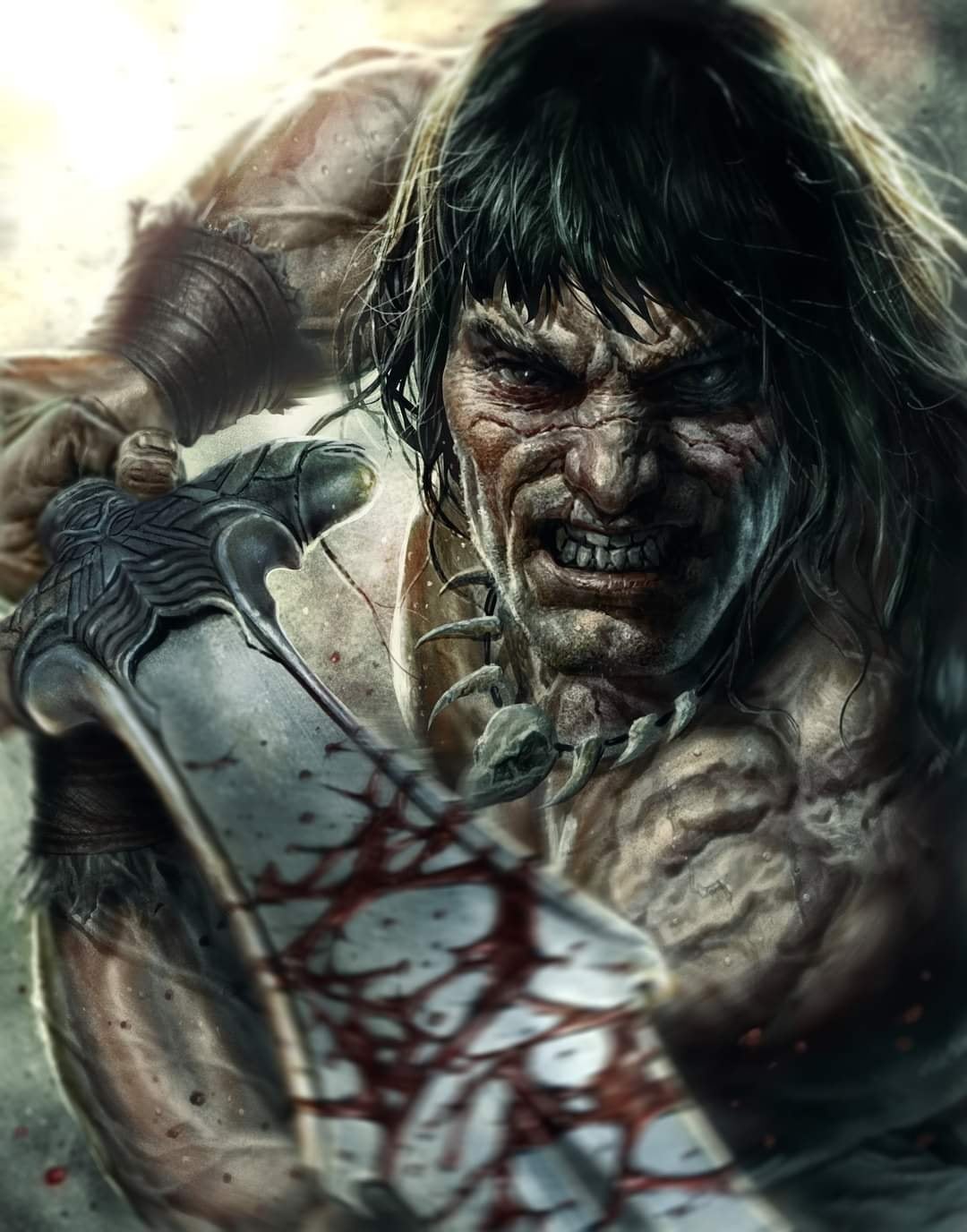
This is a guest post by Jared:
Robert E. Howard’s most famous creation, Conan of Cimmeria, lives in an era called the Hyborian Age. Conan’s barbarian–king predecessor, Kull of Atlantis, hails from a prior era called the Thurian Age. The Hyborian Age is meant to be a predecessor to a world that would be familiar to us, albeit less mystical. These ages span thousands of years yet technology, philosophy, art, architecture, agriculture, etc. never seem to progress past what we would consider that of medieval times. This consistency is purposeful and cohesive with Howard’s philosophy of history.
Generally speaking, philosophies of history are grouped into three categories. The first is also called historiography, which pertains to the epistemology of historical inquiry. Howard’s stories have nothing to say on this subject. The second type are philosophies in which human history is said to operate through a single developmental process. In these philosophies, history is a unified, teleological process in which later stages represent higher realizations of the ultimate purpose of history. These can be seen in the philosophies of Hegel, Comte, Spencer, and St. Augustine.
The third type is morphological. These philosophies explain history as the rise and fall of civilizations or empires. The manner of their rise and fall provides insight into the forward movement of history. Howard’s philosophy of history is not linear but morphological. Even in the morphological explanations provided by greats like Giambattista Vico and Arnold Toynbee, these philosophies still include some forward movement on a grand scale. Howard’s philosophy is unique in that it is not just morphological but truly circular. History never progresses past medieval times.
The reason for this is the conflict between barbarism and civilization. As is stated in Beyond the Black River: “’Barbarism is the natural state of mankind,’ the borderer said, still staring somberly at the Cimmerian. ‘Civilization is unnatural. It is a whim of circumstance. And barbarism must always ultimately triumph.’” In Howard’s fictional creation, barbarism always does, though in some cases it gets help from natural disasters (like the kind that sank Atlantis in the Thurian Age).

Howard is far from the first to see the battle between civilization and barbarism. In Western history, historians have noted for centuries that barbarian Goths defeated the Roman Empire and Mongolian hordes tread the Khwarazm Empire under hoof. In explaining these historical events, authors and philosophers alike have tended to idealize and romanticize barbarian society as one of fierce, brave, wolfish men who commune with nature and are purified by that communion. It is a society where no one is immoral to each other, but anyone can be deadly to outsiders, especially the militaries of civilized kingdoms. Barbarians laugh at weaknesses like those
exhibited by palace dwellers and revel in the difficulties of contending with nature. Their chieftains win leadership in battle, whereas kings are made from dainty princes. “Civilized men are more discourteous than savages because they know they can be impolite without having their skulls split, as a general thing.”
In this context, Howard draws from the British tradition of civilization represented by good manners, customs & courtesies, and the expectations of the aristocratic elite. “Civilized” men, in that sense, do not dirty their hands for that is a peasant’s work. Howard’s concept of civilization combines the British understanding with the German zivilzation, which conceives of civilization as the world of commerce, urban society, materialism, and all things superficial. Civilization, to put it mildly, is soulless.
Battling this sophisticated, soulless, aristocratic zivilization is the German kultur. Kultur is spiritual. It is the expression of volkgeist (national spirit), the collective identity of a people that does not sacrifice its collective spirit for material gain. Barbarians have kutlur. In Howard’s mind, much like that of the philosophers and armchair anthropologists of old, kultur is destined to overcome zivilization. Barbarian culture is destined to overcome aristocratic civilization.
Despite Howard’s strong philosophical foundation, the ages of Conan and Kull do not make any sense unless Howard can account for the lack of technological progress. Sorcery accomplishes this task. Alchemy replaces science for all intents and purposes. Science is predicated on the fact that the world is not created out of chaos. It is and has always been the logical creation of God. Because we are created in God’s image and because God is the eternal logos by which logic is defined, we can examine the world around us, understand it, and manipulate it to our advantage.
The world of sorcery is predicated on mystic chaos. A glimpse into the unknown commonly reveals cosmic horror rather than enlightenment. Every scientist is a sorcerer and every sorcerer a mad scientist. Often, sorcery represents the sinister source of aristocratic power. When sorcerers do not rule directly, they use the ruling elite to provide a steady supply of human labrats.
The very genre of Sword & Sorcery is based on the idea that only barbaric strength can defeat sorcery. In the same way that barbarism defeats civilization, it also defeats the source of the aristocratic elite’s power, which is also the source of technological advancement. This battle between barbarism and the combination of civilization and sorcery is the perpetual battle that keeps Howard’s fictional universe in a state of conflict, one which barbarism is destined to win.
It is what provides the lost world element to S&S. Sorcerers are summoned from the crypt 3,000 years after their death or resurrected from the ruins of long forgotten palaces only to wreak havoc once again. Naturally, a barbarian hero is needed to stop them.
The Howardian philosophy of history is a cycle in which a civilization grows from some band of barbarian conquerors, presumably developing urban life from slave labor. The catalyst of growth from there stems from sorcery, not technological advancement, propelling a growing society into an empire and civilization. This civilization and the sorcery that powers it are laid low by barbarian hordes. From there the cycle begins anew. 
Excellent points here. I’m going to have to forward this to my lit friends who refuse to believe REH’s works are mindless tales of swordplay.
I meant to say “are only mindless tales of swordplay.”